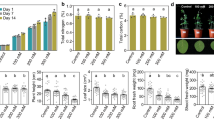Abstract
GUAR plants (Cyamopsis psoraloides) are widely cultivated in Bihar as fodder, and the green pods are also used as vegetables. A serious wilt of guar was noticed in restricted areas during September 1952 at several places, and as much as 20–25 per cent of the plants contracted the disease. The infected plants first showed yellowing of the leaves, loss of turgidity and finally wilted away. Examination of the collar portion of the plants showed thick strands of hyphæ enveloping and girdling the shoots and developing numerous chocolate-brown sclerotia 1–1.5 mm. in diameter. The hyphæ were compacted into definite strands of rhizomorphs unlike those of a similar fungus Sclerotium rolfsii Sacc. The fungus causing wilting of guar is identical with Ozonium taxanum Neal and West. var. parasiticum Thirumalachar1.
This is a preview of subscription content, access via your institution
Access options
Subscribe to this journal
Receive 51 print issues and online access
$199.00 per year
only $3.90 per issue
Buy this article
- Purchase on Springer Link
- Instant access to full article PDF
Prices may be subject to local taxes which are calculated during checkout
Similar content being viewed by others
References
Thirumalachar, M. J., Curr. Sci., 20, 244 (1951).
Author information
Authors and Affiliations
Rights and permissions
About this article
Cite this article
MISHRA, J. Ozonium Wilt of Guar and Cucurbit Plants in Bihar. Nature 172, 209–210 (1953). https://doi.org/10.1038/172209a0
Issue Date:
DOI: https://doi.org/10.1038/172209a0
Comments
By submitting a comment you agree to abide by our Terms and Community Guidelines. If you find something abusive or that does not comply with our terms or guidelines please flag it as inappropriate.



